|
|
|
Sort Order |
|
|
|
Items / Page
|
|
|
|
|
|
|
| Srl | Item |
| 1 |
ID:
092261
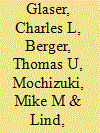

|
|
|
|
|
| Publication |
2009.
|
| Summary/Abstract |
How can Japan put its past behind? Scholars, journalists, and activists frequently argue that Japan cannot solve its "history problem" unless it follows West Germany's lead in offering contrition for World War II violence. Into this debate, Jennifer Lind's Sorry States: Apologies in International Politics offers an original and provocative contribution. Lind argues that while countries should acknowledge past atrocities, frequent public apologies can be domestically polarizing and diplomatically counterproductive. Sorry States outlines a theory of remembrance and threat perception and tests it in a comparative study of Japanese-South Korean and Franco-German relations after World War II. Its methods, data, and findings will interest not only East Asianists, but also scholars of international reconciliation and security studies more broadly. This roundtable presents three critical essays in addition to a response by the author. They discuss the mechanisms through which historical memory influences perceptions of threat, the relative weight of ideational versus material factors in threat perception, and whether changes in international norms and economic interdependence may increasingly pressure countries to confront past violence.
|
|
|
|
|
|
|
|
|
|
|
|
|
|
|
|
| 2 |
ID:
180682
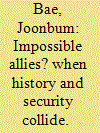

|
|
|
|
|
| Summary/Abstract |
To what degree are historical animosities regarding another country relevant for foreign policy in the face of changes in the security environment? This paper seeks to answer this question in the context of Korea–Japan relations. While pundits have pointed to the Korean public’s negative views of Japan—rooted in the colonial experience—as the explanation for the lack of cooperation between Japan and Korea in the security field, this paper argues changes in the level of common external threat can shift the public’s priorities from perceived historical injustices toward the needs of security. Surveys from the period when the security environment was shifting markedly—the final years of the Cold War (1986–1990)—reveal that public opinion regarding Japan relative to other powers in the region began to deteriorate only after the security environment improved, pointing to a limit to the extent that “history” trumps security.
|
|
|
|
|
|
|
|
|
|
|
|
|
|
|
|
| 3 |
ID:
104668
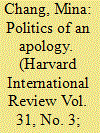

|
|
|
| 4 |
ID:
110835


|
|
|
|
|
| Publication |
2012.
|
| Summary/Abstract |
Since the beginning of the 1990s, there has been growing academic interest in the speech act of apology. Both the nature of apologetic communicative processes and the potential of apologies to promote reconciliation remain, however, under debate. The aim of this article is to map common types of rituals found in what is termed 'the age of apology', to identify the processual and structural characteristics of these rituals, and to understand their contribution to restoring relations in the global arena. The analysis yields three types of rituals of apology: purification - that is, asymmetrical rituals in which the offender issues an apology in order to purify his or her dismal past but does not necessarily need the approval of an offended party; humiliation - that is, asymmetrical rituals in which the offended party forces the offender to participate in a degradation ritual as a condition for closure; and settlement - that is, symmetrical rituals in which both sides strive to restore relations. The theoretical and practical implications of these rituals are discussed.
|
|
|
|
|
|
|
|
|
|
|
|
|
|
|
|
| 5 |
ID:
175539
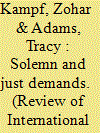

|
|
|
|
|
| Summary/Abstract |
Demands for apology are a prominent rhetorical means for pointing out transgressions in contemporary world politics. They transform ‘seen but unnoticed’ conduct into ‘seen and noticed’ transgression and attach a price tag to the restoration of damaged relations. Nevertheless, compared to the widely discussed practice of apologising, demands for apologies have received scant scholarly attention. In this article we adopt an actor-oriented perspective in order to situate the speech act of demanding an apology within the delicate management of interstate relations. In-depth content analysis of 57 cases of demands made by various state actors in a variety of diplomatic contexts between 1999 and 2019 let us delineate the discursive construction of transgressions, the normative scripts that inform acts of demands, the types of sought-after remedies, and their discursive consequences. We conclude by discussing the normative diplomatic scripts that guide demands for apology and how these speech acts reconfigure power relations in international politics.
|
|
|
|
|
|
|
|
|
|
|
|
|
|
|
|
| 6 |
ID:
171793
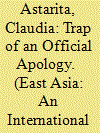

|
|
|
|
|
| Summary/Abstract |
More than 70 years after the end of the Second World War, warring nations have not completely achieved true reconciliation. For decades, official state-sanctioned apologies have been considered a useful tool to help rebuild broken international bonds, but their effectiveness in fostering national reconciliation remains debatable. On the contrary, more and more studies seem confirming civil society’s role in facilitating people’s reflection upon the most rending aspects of their own past. With civil society involvement in the discussion of Second World War responsibilities still limited in Japan, this paper recalls the experiences of Germany and Italy and the difficulties they encountered in shaping a constructive discussion on war responsibilities and reconciliation to argue that the Obama-Abe exchange of official visits in Hiroshima and Pearl Harbour in 2016 represents a crucial step forward in relaunching the debate on the Japanese Second World War narrative. In particular, this article claims that the wording and the images used by Shinzo Abe and Barack Obama could become, if well framed by national media and the official debate, “agitators of memory” pushing civil society to further and more deeply engage in this crucial discussion for the future of Japan.
|
|
|
|
|
|
|
|
|
|
|
|
|
|
|
|
| 7 |
ID:
169910
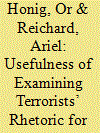

|
|
|
|
|
| Summary/Abstract |
This study advances a distinction between two generic types of terrorists’ rhetoric: (1) ideological rhetoric candidly reflecting the terrorists’ genuine beliefs and values regarding their military targeting policy (who is a legitimate target), even when adopting such rhetoric involves high image/diplomatic costs; and (2) a PR-oriented rhetoric which consciously misrepresents the terrorists’ intentions and behavior in an attempt to project a more benign and humane image, thus maintaining sympathy and rebuffing criticism. We contend that such a distinction can provide a highly useful metric for assessing terrorists groups’ rationality and pragmatism: the most pragmatic groups will shift between these two types of rhetoric depending on changing strategic needs. To show the practical usefulness of this distinction we provide criteria for categorizing terrorists’ rhetorical responses to (mostly liberal-minded) criticism that they have killed innocent civilians in their enemy’s camp. We apply our criteria by examining terrorists’ (sincere and insincere) apologies.
|
|
|
|
|
|
|
|
|
|
|
|
|
|
|
|
|
|
|
|
|